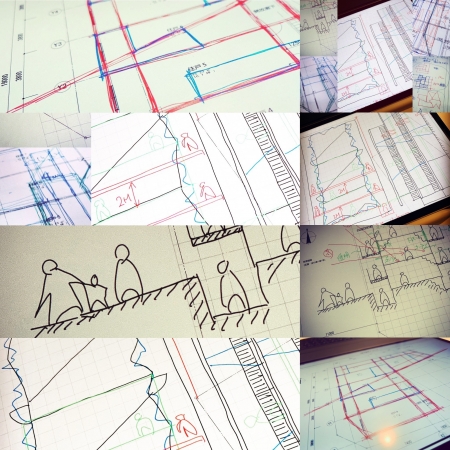終わり時
内部でもよいし、外部にもなる、それは場面場面で変えることもできるし、ずっと外部でもよいし、時々気分でそうしてもよいし、普通にずっと内部でもよい。そのような空間ができたならば、きっと見た目も、その選択、内部か外部かで違うだろうし、そこを使う人、住む人によって、全く違った空間が出現するかもしれない。
それが集合住宅だったら、住む人の数だけ、空間の選択に違いができるし、それがそのまま外観に現れる。まさに、集合住宅でしか実現できないことになる。
そのようなプランにたどり着き、ただそのプランはとても単純で、決して言葉だけが先行した空間ではなくて、実空間として、使い方として成立をしている。
答えを探さずに、ずっと解明したかったことに対して、情報収集して、整理して、丹念につながりを解きほぐすことを繰り返し行っていた。そうすると、誰も手を付けていない領域がわかり、そこが本来自分が建築の中心に据えたいことだと理解できた。
ただ、あまりにも単純すぎて、それはよいことだと思いつつ、何か付け足ししたくなるし、何かがまだ足りないので、さらに、要するに、問題を設定したくなる、終わり時に迷う。
"End time"
It can be internal or external, it can be changed in the scene, it can be external, sometimes it can be in the mood sometimes, it can be internal as usual. If such a space is made, the appearance will be different depending on the choice, whether it is inside or outside, and a completely different space may appear depending on the person who uses it or the person who lives there.
If it is a collective housing, the choice of space can differ by the number of people living, and it will appear in the appearance as it is. Indeed, it can only be realized in an apartment complex.
Having reached such a plan, the plan is so simple that it is not a space where only words first preceded, but is established as a usage as a real space.
Without searching for an answer, I have been collecting information, organizing it, and breaking up connections carefully in order to solve what I wanted to clarify. Then I understood the area that no one had put in hand, and I understood that I would like to put it at the center of the architecture.
But it's too simple, I think it's a good thing, I want to add something, and I'm still missing something, I mean, I want to set a problem, I get lost at the end.

